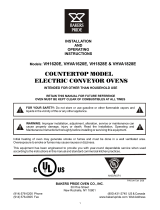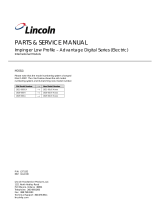
REV: 11.2.10
Lincoln Foodservice Products, LLC
1111 North Hadley Road
Fort Wayne, Indiana 46804
Telephone: 260.459.8200
Fax: 888.790.8193
Technical Support: 800.678.9511
lincolnfp.com
PARTS & SERVICE MANUAL
Digital Countertop Series 2500

Digital Countertop Service Manual
2
MODEL NUMBER KEY
EXAMPLE: 2501-000-U-0001620
25 01 - 0 00 - U - 00 0 1620
CODE LANGUAGE COUNTRY CODE LANGUAGE COUNTRY
0 English Dom. & Int. Default N Finnish Finland
B French France/Luxembourg O Restricted ---
C German Germany P Norwegian Norway
D Italian Italy Q English Japan
E Spanish Spain R Swedish Sweden
F English UK/India/Africa/Hungary S English Australia
G Spanish Mexico/Latin America T Mandarin China
H Portuguese Portugal U Restricted ---
I Not Used --- V English Pacific Rim/Korea
J Danish Denmark W English Middle East
K
Dutch &
French
Belgium X Not Used ---
L Dutch Netherlands Y Not Used ---
M Greek Greece Z Not Used ---
AGENCY CODE TABLE
CODE AGENCY
N No Agency
E CE & RoHS compliance combined
U US & Canada compliance only
A Advantage style oven to be phased-out
B Australia AGA
Finger Setup
Agency Code (i.e. CE & RoHS combined)
Custom Configuration Code (i.e. General Market Version)
Language Code
Indicates voltage (i.e. 208V, 1 phase, 60 Hz)
Model (i.e. Digital Countertop)
Platform
Size

Digital Countertop Service Manual
3
Do not work around conveyor belt with long hair, loose clothing, or dangling jewelry. Getting caught in
the conveyor belt could result in serious injury!
!
WARNING:
DIGITAL DISPLAY CONTROL PANEL
OPERATING INSTRUCTIONS
Prior to operating your new countertop oven, it is important to understand the available options. Following is a
chart designed to better illustrate these options.
CONTROLS DESCRIPTION
Belt Speed / Time Control
Belt speed refers to how quickly the food item travels through the oven. This is shown on the
display board as a unit of measure (fast to slow) between 0:30 seconds and 15:00 minutes.
Temperature Control
The countertop oven will allow you to determine the temperature setting of the oven. You
have the ability to program your oven so that more (or less) heat will emanate from the unit.
This is shown on the display board as a unit of measure between 90°F – 600°F.
Belt Direction
The countertop oven will allow you to change the direction in which the conveyor belt moves.
Pressing the “Belt Direction Button” will change the direction of travel between left-to-right
and right-to-left options.
POWER-UP THE OVEN
1. Turn the “On/Off Switch” to the “on” position. The oven will now run according to the previously programmed
settings. Allow the oven to preheat for approximately 30 minutes.
TEMPERATURE CONTROL BUTTON
DISPLAY SCREEN
MENU PRESET BUTTONS
BELT DIRECTION BUTTON
BELT SPEED / TIME CONTROL
BUTTON
ON / OFF SWITCH
ON / OFF SWITCH

Digital Countertop Service Manual
4
CHANGE BELT DIRECTION
1. Press the “Belt Direction Button” to change the direction in which the conveyor belt travels.
PROGRAMMING THE FOUR MENU PRESET BUTTONS
1. Press and hold the desired menu button (1-4) for approximately 5 seconds. The display screen will flash the
temperature setpoint. Press the (+) or (-) button to reach the desired temperature.
NOTE: All menu presets come with default settings of “Pizza” at 550°F / 6:00.
2. Press and release the menu button again to reach the time/belt speed setpoint. The display will flash the
time/belt speed setpoint. Press the (+) or (-) button to reach the desired time/belt speed.
3. Press and release the menu button again to reach the menu item name. The display will flash a menu item
name. Press the (+) or (-) button to locate the desired name. Once the desired name has been selected,
press and release the menu button again to activate the menu setting.
NOTE: The following menu items have been preset into the software package of this oven.
• Pizza • Sandwich • Wrap
• Wings • Chicken • Menu 1
• Breakfast • Snack • Menu 2
• Breadsticks • Snack • Menu 3
• Thin Pizza • Dinner • Menu 4
BELT DIRECTION BUTTON
MENU PRESET BUTTONS

Digital Countertop Service Manual
5
PROGRAMMING THE MANUAL MODE
1. Press and hold the Time and Temperature buttons for approximately 5 seconds to enter manual mode.
Press the Time button to allow for changes in time. Press the (+) or (-) button to reach the desired time.
2. Press and release the Temperature button to allow for changes to temperature. Press the (+) or (-) button to
reach the desired temperature. Press and release the Temperature button again to leave manual mode and
activate the manual settings.
SHUTDOWN
1. Push the
“On/Off Switch” to the “off” position.
2. As each countertop oven is equipped with a 30-minute cool-down timer, the fan motor will continue to run for
30 minutes after the unit has been turned off. The fan motor will automatically stop at the end of the 30-
minute cool-down period.
BELT DIRECTION BUTTON
BELT SPEED / TIME CONTROL
BUTTON
TEMPERATURE CONTROL BUTTON
ON / OFF SWITCH

Digital Countertop Service Manual
6
ACCESSING SUBSET MENU OPTIONS
There are three settings that can be accessed by an authorized technician; the temperature calibration setting,
temperature display (°F or °C) and the conveyor belt direction.
SUBSET MENU INSTRUCTIONS
STEP ONE
To access the subset menu, press and hold the (+) and (-) buttons for approximately 5 seconds. The calibration
value will be displayed. If a change to the calibration value is desired, press either the (+) or (-) buttons until the
desired value is reached. If no change to calibration value is needed, press the “Temperature Control” button to
reach the temperature display setting.
STEP TWO
Complete step one. To change the temperature display setting between °F and °C, simply press the (+) or (-)
button until the desired setting is displayed. If no change to the temperature display setting is needed, press the
“Belt Speed / Time Control” button to reach the conveyor belt direction setting.
STEP THREE
Complete steps one and two. To change the conveyor belt direction, press the (+) or (-) button until the desired
belt direction setting is reached. Once reached, press the “Belt Speed / Time Control” button to save the
changes and exit the subset menu.
TEMPERATURE CONTROL BUTTON
(+) AND (-) BUTTONS
BELT SPEED / TIME CONTROL
BUTTON

Digital Countertop Service Manual
7
SEQUENCE OF OPERATION
Power Supply
Electrical Power is supplied to the oven by a three conductor cord set.
Black conductor is HOT.
White conductor is HOT.
Green conductor is ground.
Line voltage is supplied through the fuses(F1, F2)and line one(L1) through the
manual resettable control box high limit(T1) to the ON/OFF switch, the Cooling
Fan Thermostat(T2), the Cool Down Timer(TD), and to the Main Fan Relay(R2).
Control Box Auto Cool Down
The cooling fan thermostat is connected to the axial fan that cools the control
box. Line two (L2) connects to the other side of the Control Box Cooling Fan
motor bypassing the ON/OFF switch. The thermostat closes at 120°F cycling the
fan keeping the control box below 120°F
Main Fan Circuit
Upon activating the ON/OFF switch, power is supplied to the Cool Down Timer
(TD) through the timer (TD) to the Main Fan Relay (R2) through the relay (R2) to
power the Main Fan (M1).
Heating Circuit
When the heating contactor then closes, supplying line voltage to the SSR for
the heater. Line voltage is then supplied to the element through the SSR as
needed to maintain set point temperature.
Oven Control
Upon closing the ON/OFF switch, the transformer is supplied line voltage and
then supplies 24 VAC to the control board and controls the conveyor motor. The
control reads the thermocouple and cycles the SSR to the heater to maintain set
point temperature. The control board also reads the input from the key pad to
make adjustments for cook time and temperature.
Conveyor Drive
The control board transformer’s (XR) secondary supplies 24 VAC to the control
board (CNTR). The conveyor control converts AC to DC and DC power is
supplied to the conveyor motor (M3). 2-29 VDC is supplied to the motor (M3)
through 4 wires (2 sets A+ A- & B+ B-).

Digital Countertop Service Manual
8
SCHEMATIC DIAGRAM
2501-000, 2501-001, 2501-002, 2501-003, 2501-008, 2501-009, 2502-000, 2502-001, 2502-002, 2510-000

Digital Countertop Service Manual
9
SCHEMATIC DIAGRAM
2504-000, 2504-001, 2514-000

Digital Countertop Service Manual
10
SCHEMATIC DIAGRAM
2505-000

Digital Countertop Service Manual
11
SCHEMATIC DIAGRAM
2508-000, 2509-000, 2512-000, 2512-004

Digital Countertop Service Manual
12
TROUBLESHOOTING GUIDE
SYMPTOM POSSIBLE CAUSE EVALUATION
Oven fan will not run
Incoming Power Supply
Check circuit breaker, reset if required.
Check power plug to be sure it is firmly in
receptacle. Measure incoming power, call power
co. if needed.
5 Amp Fuse and Fuse Holder
Check fuse for continuity, replace if necessary.
Check fuse holder for line voltage.
Hi-Limit Thermostat, Control
Box
Terminals are normally closed and opens at
140°F(60°C), if open, reset thermostat and test
oven for proper operation.
If thermostat will not hold, and control box
temperature is not exceeding 140°F(60°C)
replace thermostat.
Oven Power Switch
Check for 208/240VAC supply to switch. If no
voltage is present, trace wiring back to fuse holder
and Control Box High Limit Thermostat. Check
continuity between switch terminals. Replace
switch as needed.
Oven Fan Time Delay Relay
and Oven Fan Relay
Check for 208/240VAC at terminals 1 and 6 on
Time Delay Relay(TD).
If no voltage is present at (TD) check Main Switch.
If voltage is present at TD 1 and 6 then check for
208/240 VAC output to Oven Fan Relay(R2) coil.
If no voltage is present replace Time Delay Relay.
If voltage is present check normally open(N.O.)
contacts of relay(R2) for 208/240 VAC on both
sides of the contact. If voltage is present to coil
and to one side of the N.O. contact but not the
other replace relay. If voltage is present then
proceed.
Main Fan Motor and
Capacitor
Check for 208/240VAC supply to the motor. If no
voltage is present, trace wiring back to the
relay(R2). If voltage is present but motor does not
turn:
WITH POWER OFF:
Turn fan blade to check for
locked rotor.
WARNING: Capacitor has a stored charge,
discharge before testing.
Check capacitor with multimeter.
Check motor for opens, shorts or grounds.
No Control Box Cooling Fan
Incoming Power Supply
Check circuit breaker, reset if required.
Check power plug to be sure it is firmly in
receptacle.
Measure incoming power, call power co. if
needed.

Digital Countertop Service Manual
13
5 Amp Fuse and Fuse Holder
Check fuse for continuity, replace if necessary.
Control Box Hi-Limit
Thermostat
Check for continuity through the switch(T2).
Terminals are normally closed and open at
140°F(60°C), if open, reset thermostat and test
oven for proper operation.
If thermostat will not hold, and control box
temperature is not exceeding 140°F (60°C),
replace thermostat.
Oven Power Switch
Check for 208/240VAC supply to switch. If no
voltage is present, trace wiring back to fuse holder
and control box high limit thermostat(T2). Check
continuity between switch terminals. Replace
switch as needed.
Cooling Fan Motor
Check for 208/240VAC supply to the cooling fan. If
no voltage is present, trace wiring back to the
relay(R2).
If voltage is present and motor does not run,
check for opens, shorts or grounds.
WITH POWER OFF: Check for locked rotor.
Cooling fan continues to run
Control Box Thermostat
Check cooling fan thermostat. Thermostat closes
at 120°F (49°C) and opens at 100°F(38°C).
Please note: Thermostat will remain closed if
control box temperature remains above 120° F
(49°C).
Oven will not heat
Cavity High Limit Thermostat
Check High Limit Thermostat (T1) for continuity
through switch.
Terminals are normally closed, open at 660°F
(350°C). If open, push in reset button and retest.
If thermostat will not hold for maximum oven
temperature, and oven is not exceeding
temperature dial setting, check for proper location
of capillary bulb in its bracket. If in proper location
and Hi Limit continues to trip, replace Hi Limit
Thermostat.
Heating Relay
Check for 208/240VAC at coil of Heating
Relay(R1)
If no voltage is present at coil then check Cavity Hi
Limit.
If voltage is present at coil then check for 208/240
at output of relay. If no output voltage replace
relay.
Control Transformer
Check for 208/240VAC at the primary of the
transformer. If voltage is present check for 24VAC
on secondary side. If no 24 VAC is present check
circuit breaker(CB) on transformer. If circuit

Digital Countertop Service Manual
14
breaker is not open and still no secondary voltage
then replace transformer.
Solid State Relay
Check for 24VAC at terminals A1 and A2 of the
Solid State Relay(SSR). If no voltage is present
then perform thermocouple checks(Thermocouple
type j testing). If thermocouple checks good and
still no voltage at terminals A1 and A2 then
replace control board.
Heating Element
If 24VAC is present at output of SSR but no heat
check for 208/240 at element terminals. Check
amp draws at each supply line.
208V oven is rated at 29 amps. Element is 5600W
with a cold ohms reading between 8.51 to 7.36.
240V oven is rated at 24 amps. Element is 5600W
with a cold ohms reading between 11.33 to 9.81.
If voltage is present but no amp draw replace
element.
208V Red, 240V Blue, 220V Yellow, 200V
Orange, 380V Violet, 400V 1 PH Brown, 415V
Green, 200V 3 PH Orange, 380V 3 PH Violet,
400V 3 PH Brown, 415V 3 PH Green
Oven will not heat
Thermocouple type j testing
WITH POWER ON AND THERMOCOUPLE
ATTACHED TO THE OVEN CONTROL:
Measure the DC millivolt output of the
thermocouple. Refer to the chart below for
readings. If these are not achieved, replace
thermocouple.
TEMP.°F (°C) D.C. MILLIVOLTS (APPX)
200 (93) 3.4
250 (121) 4.9
300 (149) 6.5
350 (177) 8.0
400 (204) 9.5
450 (232) 11.1
500 (260) 12.6
550 (288) 14.2
600 (316) 15.7
Temperature Probe
Placement
To verify the oven cavity temperature, insert your
temperature meter probe tip under the conveyor
and approximately 3/8“(10mm) into the bottom
finger #4, 3
rd
row from outside edge, 3
rd
hole from
the rear.
This process is also used when calibrating the
oven temperature. Allow temperature in oven to
stabilize for 30 minutes before calibrating.
Note: For best result, we recommend
disconnecting the conveyor drive coupling to stop
the conveyor from moving.
Conveyor will not run
Control Transformer
With the Main Fan Switch(S) on, check for
208/240VAC at the primary of the transformer.
If no voltage is present, check for voltage at the

Digital Countertop Service Manual
15
power switch.
If voltage is present at the primary, check for
voltage on the secondary side of transformer (24
VAC).
If no 24 VAC present on secondary check circuit
breaker (CB) on transformer. If still no secondary
voltage then replace transformer
Digital Control
Check for 24 VAC input to the control board at
terminals J1 and J2.
Check for 5.2 Ω between A+, A- and B+,B- on
Conveyor Motor. If resistance is 5.2 Ω replace
main control board.
Conveyor will not run
Conveyor Motor
The GE conveyor motor on the 2501/2502 is a
stepper type. The only way to accurately test the
unit at this time is by measuring the resistance
between the windings. From A+ to A- and from B+
to B- should measure approximately 5.2 ohms.
If the motor fails the above test, replace motor.
Conveyor motor runs, but
intermittent or no speed
control
Transformer
Check 208/240 input voltage to transformer. If no
voltage present check the On/Off switch (S) and
the Control Box Hi-Limit (T1) for continuity. Also
check 5 amp fuses (F1, F2) for continuity. If
voltage is present, Check for 24VAC output
from transformer. If no voltage is present check
circuit breaker (CB) on output of transformer, if still
no secondary voltage from transformer replace
transformer.
Conveyor Control
Check for 2-29VDC output from conveyor control
at J3-2 and J3-1. If no voltage present but 24 VAC
input at J1 and J2 replace main control board.
Conveyor Motor
The 4 wire conveyor motor on the 2501/2502 is a
stepper type. The only way to accurately test the
motor at this time is by measuring the resistance
between the windings. From A+ to A- and from B+
to B- should measure approximately 5.2 ohms. If
resistance is good replace digital control board.
If the motor fails the above test, replace motor.
No Digital Display
Transformer
Check 208/240 input voltage to transformer. If no
voltage present check the On/Off switch (S) and
the Control Box Hi-Limit (T1) for continuity. Also
check 5 amp fuses (F1, F2) for continuity.
Check for 24 VAC at J1 and J2 power into the
digital control.
Check circuit breaker (CB) on output of
transformer.
If no secondary voltage from transformer replace
transformer.
If secondary voltage is present then replace main
control board.

Digital Countertop Service Manual
16
REMOVAL, INSTALLATION & ADJUSTMENT GUIDE
Oven Back Removal
WITH OVEN POWER OFF
• Remove six (6) nuts and remove motor cover and
vent piping.
• Disconnect all wiring from motor and heating
element.
• Remove four (4) nuts holding oven back and
remove oven back.
• Reassemble in reverse order.
NOTE: Be certain to replace insulation seal when oven
back is re-installed.(pn.369470)
Oven Hi-Limit Replacement
WITH OVEN POWER OFF
• Remove oven back assembly. (See OVEN BACK
REMOVAL)
• Remove two (2) wires from thermostat.
• Remove retaining nut from the front of thermostat
and remove thermostat.
• Remove capillary tube from bracket in back of
oven and remove assembly out through control
box side.
• Reassemble in reverse order. Check for proper
routing through insulation. Be sure capillary tube is
held securely in the bracket and the reset button
has been pushed in and set.
NOTE: All excess capillary tubing should be brought back
into control box area. Be certain to replace insulation seal
when oven back is re-installed.
Thermocouple Replacement
WITH OVEN POWER OFF
• Remove oven back assembly. (See OVEN BACK
REMOVAL)
• Remove thermocouple sensor from wire form in
rear of oven cavity.
• Disconnect and mark wires from control board
(red=neg., white=pos.) and remove thermocouple.
• Reassemble in reverse order keeping junction
inside the control box and not in the heating cavity.
Check operation.
NOTE: Be certain to replace insulation seal when oven
back is re-installed.(369470)
Power Switch Replacement
WITH OVEN POWER OFF
• Remove conveyor and oven side panels.
• Remove two (2) screws from ends of control panel
and remove panel.
• Disconnect four (4) wires from switch assembly.
Mark wires for reinstallation.
• Depress clips on side of switch and remove from
panel.
• Reassemble in reverse order and check operation.

Digital Countertop Service Manual
17
Main Fan Removal
WITH OVEN POWER OFF
• Remove oven back assembly. (See OVEN BACK
REMOVAL)
• Loosen two (2) screws on fan hub and slide fan off
of motor shaft. (Note location of fan on motor
shaft for reinstallation is 3/16" (4.5 mm) from
back wall.)
• Reinstall in reverse order and check system
operation. Allow 30 minute preheat and verify that
fan is not rubbing.
NOTE: Be certain to replace insulation seal when oven
back is re-installed.(pn.369470)
Heating Element Removal
WITH OVEN POWER OFF
• Remove oven back assembly. (See OVEN BACK
REMOVAL)
• Remove three (3) screws from heating element
brackets and slide element out of back assembly.
• Reassemble in reverse order. Verify by color code,
dot or band on element that correct element is
being installed.
NOTE: Be certain to replace insulation seal when oven
back is reinstalled.(pn.369470)
Air Pump Removal
WITH OVEN POWER OFF
• Remove oven back assembly. (See OVEN BACK
REMOVAL)
• Remove main fan. (See MAIN FAN REMOVAL)
• Remove heating element. (See HEATING
ELEMENT REMOVAL)
• Remove five (5) screws from inner back assembly
and lift off.
• Loosen two screws on air pump hub and slide off
shaft. (Note location for reinstallation,
approximately 3/64“ (1.2 mm) clearance from back
wall).
• Reinstall in reverse order and check operation.
• Allow 30 minute preheat and verify that fan is not
rubbing.
NOTE: Be certain to replace insulation seal when oven
back is re-installed. (pn.369470)
Fan Motor Removal
WITH OVEN POWER OFF
• Remove oven back assembly. (See OVEN BACK
REMOVAL)
• Remove main fan. (See MAIN FAN REMOVAL)
• Remove heating element. (See HEATING
ELEMENT REMOVAL)
• Remove air pump assembly. (See AIR PUMP
REMOVAL)
• Remove four (4) screws from motor mount
pedestal and lift motor and pedestal off outer back
assembly.
• Remove four (4) nuts from front motor studs and
remove mounting pedestal.
• Reassemble in reverse order and check operation.

Digital Countertop Service Manual
18
NOTE: Be certain to replace insulation seal when oven
back is re-installed (pn.369470).
Conveyor
To remove or add section of Belting
• Locate connecting links on the conveyor belt, turn
belt to place the links on the top left end of the
conveyor, approximately 8” (203mm) from the
shaft.
• If belt is too tight or loose, a belt link will have to
be installed or removed. Proper tension allows the
belt to be lifted within 2” (51mm) from the top of
the conveyor opening.
• You can remove the connecting links by grasping
them with a pair of pliers and slipping the eye of
the connecting link over the wire of the other belt
links. Remember this process for reinstallation.
• To add a belt link just insert or snap in one belt link
at a time into the last link of the upper section of
belting.
• To remove a belt link just grasp the end of the last
belt link of the upper section and pull out.
• Reconnect connecting links by reversing process
as they were removed.
To replace Belting
• Remove the connecting links by grasping them
with a pair of pliers and slipping the eye of the
connecting link over the wire of the other links.
Also notice the direction of the opening on the
links. – The belts will have to be reinstalled
with the opening facing the same way.
• Carefully pull out the belt, rolling it up as you go.
• To reinstall put the loose end of the belt around
the idler shaft and back on the conveyor. The belt
must be routed on top of the lower conveyor slider
bed.
• NOTE: If the belting does not curl around the
sprockets and lay flat, remove the belting and turn
the belting over.
• Remove belt links as needed for proper tension.
• Reconnect connecting links by reversing process
as they were removed.

Digital Countertop Service Manual
19
GENERAL VIEW
LETTER PART NUMBER DESCRIPTION
A 340038 Switch, Lighted Rocker
B
See Membrane Switch Assembly Section in this Manual
C
See Cavity Assembly Section in this Manual
D
See Rear Wall Assembly Section in this Manual
E 370020 Motor Cover Assembly
G 370041 Duct, Inner/Outer Assembly
H 370102 Cap, Flue Bottom
I 369453 Flue Duct Assembly
J 370019
Power Cord
(models 2501-000, 2501-010, 2501-001, 2501-002, 2501-003, 2502-000, 2502-
001, 2502-002, 2510-000 only)
K
See illustration below
Finger Assembly
L
See Membrane Switch Assembly Section in this Manual
H
A
B C
D
E
G
I
J
K
L
Finger Cover
370657
Columnating Plate
370658
Finger Housing
369442
FINGER ASSEMBLY

Digital Countertop Service Manual
20
MEMBRANE SWITCH ASSEMBLY
LETTER PART NUMBER DESCRIPTION
A
70001558 Bracket
4070541 Stand-Off
10001209 10-32 x ¾ self-clenching
B 371109 Control Board
C
10004756 Membrane Switch with Buttons (All models except 2501-002 and 2502-002)
371108 Membrane Switch with Buttons (Models 2501-002 and 2502-002 only)
A
B
C
Page is loading ...
Page is loading ...
Page is loading ...
Page is loading ...
Page is loading ...
Page is loading ...
Page is loading ...
Page is loading ...
Page is loading ...
Page is loading ...
Page is loading ...
Page is loading ...
Page is loading ...
Page is loading ...
Page is loading ...
Page is loading ...
/









